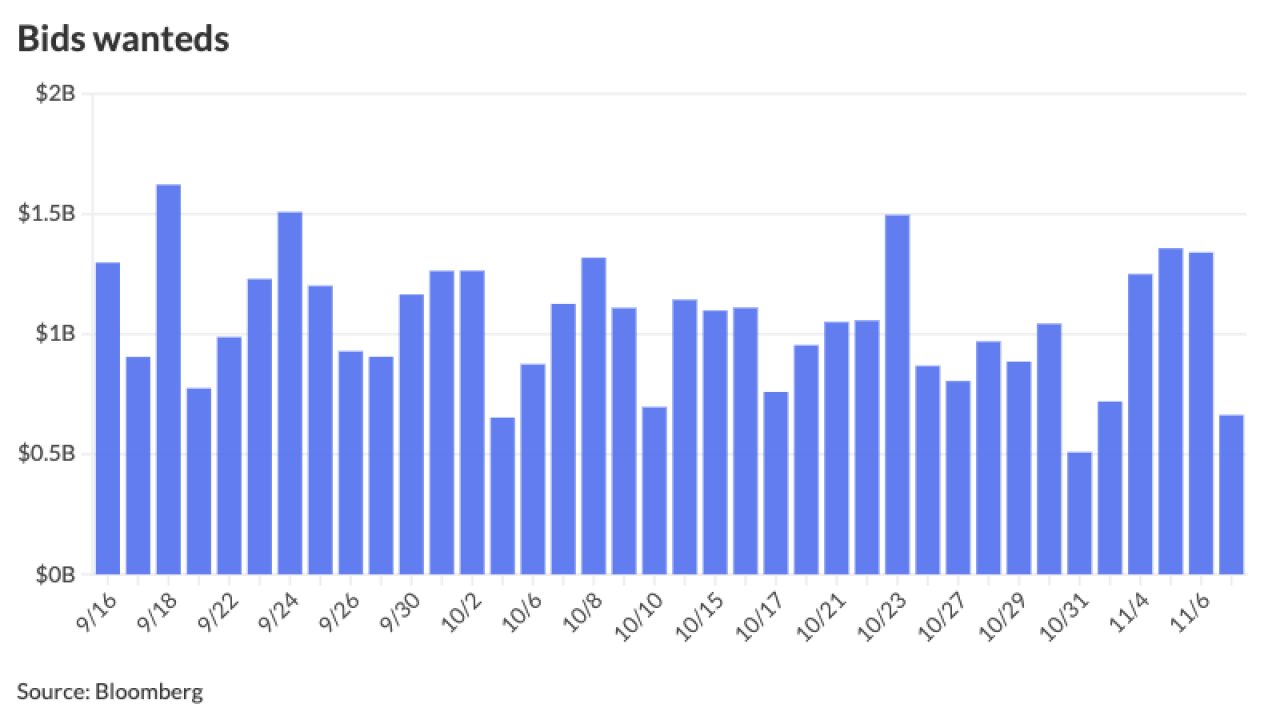
Maine voters have approved $50 million of new borrowing, but a cloud remains over whether the Pine Tree State's Republican governor will allow the bond issuance to proceed in 2015 after he fought against new borrowing for much of his first term.
Voters in Maine approved all six general obligation bond propositions on the Nov. 4 ballot, authorizing $50 million in new borrowing to invest in agriculture, small business loans, building a medical research center and making marine-related capital investments. However, voters also re-elected Gov. Paul LePage, who had made a point during his first term of refusing to issue already voter-approved bonds on the belief that the state needs to first "pay its bills."
Most recently, LePage threatened to block bond sales last spring, but lifted his objection as part of budget negotiations after the Democratic-controlled legislature agreed to maintain rather than decrease the size of the state's rainy day fund. The Republican governor had argued that taking from the $21 million fund geared toward emergencies would have put state at risk for a credit rating downgrade and led to higher interest rates on bonds. He also declined to approve the sale of voter-approved bonds from February 2011 to June 2013 because he wanted the state to pay off its Medicaid debt to public hospitals.
Maine House Speaker Mark Eves, D-North Berwick, says releasing the approved bonds is important for the state's economic health. The state has recovered only 57% of jobs lost since the 2008 recession compared to 122% in New England and 118% nationally, according to the Maine Center for Economic Policy.
"Now is the time to release the bonds and move quickly to help boost job growth," said Eves, who has served in the speaker post since Dec. 5, 2012. "If we were keeping pace with our New England neighbors, Maine would have 16,000 more jobs now than we do today. We must come together to go from lagging to leading."
LePage spokeswoman Adrienne Bennett said the governor does not have a timetable yet on when the recently bonds may be authorized since it is too early to go to market and the 2015 budget is being "tirelessly" worked on. She said $127 million of general obligation bonds sold in June were bought at low rates at competitive auction by Raymond James and JPMorgan.
"The Governor understands the importance of bonds," said Bennett. "More importantly, he understands when is the most appropriate and effective time to utilize bonds so Mainers receive the best return on their investment."
LePage's efforts to hold up bond sales are largely attributable to disputes he has had with the legislature in his first four years in office, according to Charlie Colgan, a professor of public policy and management in the Edmund S. Muskie School of Public Service at the University of Southern Maine.
Colgan said with the legislature split the next two years between a Republican Senate and Democratic House, the status of future bond sales may become more unpredictable.
In LePage's first two years in office, the GOP controlled both houses, and in the final year Democrats controlled them.
"The politics of the bonding is going to get more complicated," said Colgan, who served as chair of the State of Maine Consensus Economic Forecasting Commission from 1992 to 2010. "The biggest fight will come with the bond issues that are going to be debated in the next legislative session."
Colgan said Maine's bond package is typically submitted in late January or early February with negotiations occurring in May and June. He expects the bonds approved by voters on Nov. 4 to be ultimately authorized by the governor, but said if LePage decides to pick a budget fight with legislators then they could be used as a bargaining chip.
"You have a combination of a traditional conservative Republican's reluctance to spend state money and go into debt and an ongoing dispute with state legislatures on state spending," said Colgan. "It's going to be interesting."
With the backing of local Tea Party activists, LePage was elected as Maine's 74th governor in 2010 with just 38% of the vote against four other candidates. He campaigned on a platform of shrinking government and lowering taxes. He was re-elected in November with 48.2% of the vote in a three-candidate race.
The libertarian-oriented Cato Institute gave Gov. LePage an A rating in its Fiscal Policy Report Card on America's Governors 2014 and credited him for vetoing the legislature's 2013 budget since it contained tax increases. The veto was overridden by the legislature.
"It is prudent for Governor LePage to limit Maine's borrowing while trying to restore fiscal sanity to the state," said Nicole Kaeding, a budget analyst for the Cato Institute. "Governor LePage has been a consistent supporter of tax-and-spending restraint and limiting bond buying continues that tradition."
Kaeding added that LePage deserves praise for his efforts to look beyond borrowing when trying to get Maine on financial track.
"Too often, states borrow money to fill in budget gaps instead of enacting budget reforms," said Kaeding. "Governor LePage's fiscal discipline will help reduce the burden of government on Maine families and businesses."
Outgoing State Treasurer Neria Douglass, a Democrat, said she has not received any indication from Gov. LePage on his plans for bond sales in 2015. The $50 million in bond propositions approved by voters in November created a backlog of $177 million in new borrowing heading into the New Year. While some bonding moved forward in 2014, the governor's opposition has created a challenge for Douglass in the state's top financial post.
"Sometimes you move too far backwards it's difficult to move forward," said Douglass, who will be replaced as treasurer on Jan. 1.
"We clearly lost jobs, infrastructure improvements, economic development and that is unfortunate."
Maine selects constitutional officers through a secret ballot in the Legislature, which voted to replace Douglass with Terry Hayes, an independent.
Jennifer Weiner, a senior policy analyst with the New England Public Policy Center at the Federal Reserve Bank of Boston, focuses her research on state debt affordability and says Maine may have missed an opportunity to issue bonds in a low-interest-rate environment.
"Some would argue that this is the ideal time to issue bonds for infrastructure projects," said Weiner. "Delaying bond sales in this environment could possibly cause a state to miss an opportunity to create some needed jobs in a down economy, as well as delay the improvements to the infrastructure itself and the benefits associated with those improvements."
Standard & Poor's credit analyst Henry Henderson said a short-term delay in issuing bonds is not a major concern from a credit perspective, but if infrastructure projects are neglected over a lengthy period it could be problematic.
"It's not unusual for there to be delays authorizing bonds that voters approved quickly," said Henderson, who is the lead credit analyst for Maine and has been a director in S&P's public finance group since 2002. "Neglecting infrastructure we do see having long-term negative consequences."
Maine GO bonds are rated Aa2 by Moody's Investors Service and AA by Standard & Poor's, according to the state treasurer's office.





